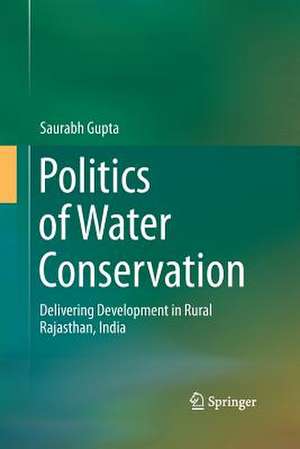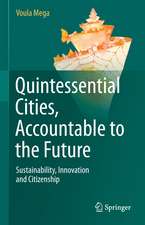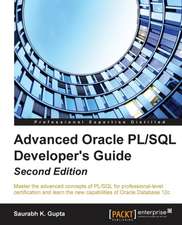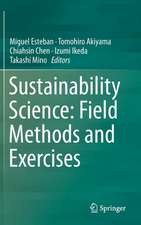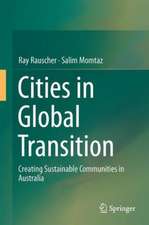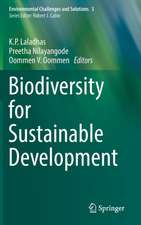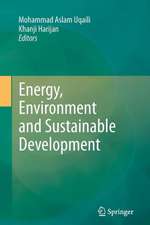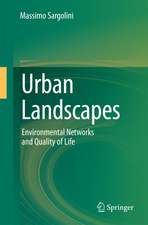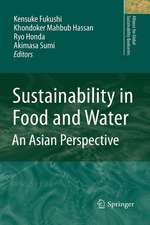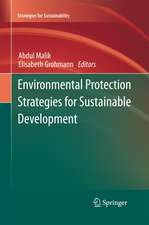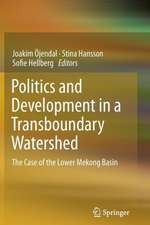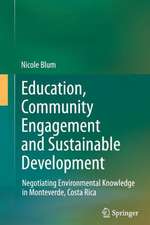Politics of Water Conservation: Delivering Development in Rural Rajasthan, India
Autor Saurabh Guptaen Limba Engleză Paperback – 23 aug 2016
Taking cue from watershed development and water conservation projects over the last two decades, the book engages with the larger question of ‘how’ of delivering development. It examines the complex processes of cooperation, competition, negotiations, contestations and conflicts between different stakeholders, including the agents of development and differently positioned rural social groups in the context of Rajasthan. The book demonstrates that the recent interventions in watershed development and rainwater harvesting have considerably shaped the politics of development in Rajasthan in a number of ways: by becoming a site for the remaking of the ‘state’ and its internal relations, by disturbing the local hegemony in the countryside, by creating new relations of
patronage between diverse agents and recipients of development, by increasing the associational capacity as well as creating new conflicts (intra and inter village) and by initiating competition and cooperation between the various agents of development over control of local resources and power.
| Toate formatele și edițiile | Preț | Express |
|---|---|---|
| Paperback (1) | 550.76 lei 38-44 zile | |
| Springer International Publishing – 23 aug 2016 | 550.76 lei 38-44 zile | |
| Hardback (1) | 561.11 lei 38-44 zile | |
| Springer International Publishing – 12 oct 2015 | 561.11 lei 38-44 zile |
Preț: 550.76 lei
Preț vechi: 688.44 lei
-20% Nou
Puncte Express: 826
Preț estimativ în valută:
105.39€ • 110.33$ • 87.20£
105.39€ • 110.33$ • 87.20£
Carte tipărită la comandă
Livrare economică 01-07 aprilie
Preluare comenzi: 021 569.72.76
Specificații
ISBN-13: 9783319369419
ISBN-10: 3319369415
Pagini: 162
Ilustrații: XIV, 162 p.
Dimensiuni: 155 x 235 mm
Greutate: 0.26 kg
Ediția:Softcover reprint of the original 1st ed. 2016
Editura: Springer International Publishing
Colecția Springer
Locul publicării:Cham, Switzerland
ISBN-10: 3319369415
Pagini: 162
Ilustrații: XIV, 162 p.
Dimensiuni: 155 x 235 mm
Greutate: 0.26 kg
Ediția:Softcover reprint of the original 1st ed. 2016
Editura: Springer International Publishing
Colecția Springer
Locul publicării:Cham, Switzerland
Cuprins
Introduction.- Understanding the Politics of Watershed Development.- Rajasthan: The Land of Rajas (Kings) and Droughts.- National Goals, International Agenda and Local Needs.- Development Specialists and Grassroots Workers.- ‘Village Republics’ and People’s Movement.- Notes on the Politics of Rural Development in Rajasthan.
Textul de pe ultima copertă
This book examines the politics of rural development with special reference to watershed development interventions in the desert province of Rajasthan in India. Watershed development (and rainwater harvesting) is one of the most significant rural development interventions in rainfed areas of India since the early 1990s. A range of developmental actors including the state watershed department, international donors, NGOs and grassroots organisations are involved in sponsoring watershed development projects. Using multi-sited ethnography and conversational interviews with the deliverers as well as recipients of development, the book compares and contrasts the watershed interventions of the state and two different kinds of NGOs in Rajasthan. While conventional studies on watershed development have focused on the evaluation of ‘success’ or ‘failure’ of particular projects, whether implemented by the state or NGOs, the book moves beyond this narrow analytical gaze to look at the roles, agendas and interests of multiple development agencies, often partnering together and sometimes competing with each other as part of, what the author calls, the ‘watershed development regime’.
Taking cue from watershed development and water conservation projects over the last two decades, the book engages with the larger question of ‘how’ of delivering development. It examines the complex processes of cooperation, competition, negotiations, contestations and conflicts between different stakeholders, including the agents of development and differently positioned rural social groups in the context of Rajasthan. The book demonstrates that the recent interventions in watershed development and rainwater harvesting have considerably shaped the politics of development in Rajasthan in a number of ways: by becoming a site for the remaking of the ‘state’ and its internal relations, by disturbing the local hegemony in the countryside, by creating new relations of
patronage between diverse agents and recipients of development, by increasing the associational capacity as well as creating new conflicts (intra and inter village), and by initiating competition and cooperation between the various agents of development over control of local resources and power.
Taking cue from watershed development and water conservation projects over the last two decades, the book engages with the larger question of ‘how’ of delivering development. It examines the complex processes of cooperation, competition, negotiations, contestations and conflicts between different stakeholders, including the agents of development and differently positioned rural social groups in the context of Rajasthan. The book demonstrates that the recent interventions in watershed development and rainwater harvesting have considerably shaped the politics of development in Rajasthan in a number of ways: by becoming a site for the remaking of the ‘state’ and its internal relations, by disturbing the local hegemony in the countryside, by creating new relations of
patronage between diverse agents and recipients of development, by increasing the associational capacity as well as creating new conflicts (intra and inter village), and by initiating competition and cooperation between the various agents of development over control of local resources and power.
Caracteristici
First systematic attempt to highlight the roles and agendas of multiple development agencies engaged in water conservation in the largest and driest province of India, Rajasthan Critical engagement with mainstream as well as main alternative literature on management of local natural resources Analysis of watershed interventions beyond the narrow managerial perspective of evaluating ‘success’ or ‘failure’ and looking at the question of ‘how’ in delivering development Contribution to scarce literature on natural resources management and watershed development from sociological/anthropological perspectives Ethnographic study of non-governmental development organizations and official development agencies in the context of rural development
